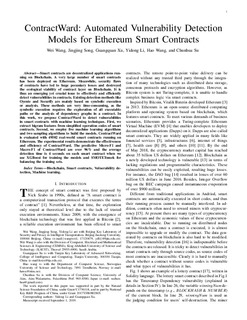ContractWard: Automated Vulnerability Detection Models for Ethereum Smart Contracts
Journal article
Accepted version

Åpne
Permanent lenke
http://hdl.handle.net/11250/2639054Utgivelsesdato
2020Metadata
Vis full innførselSamlinger
Originalversjon
IEEE Transactions on Network Science and Engineering. 2020 10.1109/TNSE.2020.2968505Sammendrag
Smart contracts are decentralized applications running on Blockchain. A very large number of smart contracts has been deployed on Ethereum. Meanwhile, security flaws of contracts have led to huge pecuniary losses and destroyed the ecological stability of contract layer on Blockchain. It is thus an emerging yet crucial issue to effectively and efficiently detect vulnerabilities in contracts. Existing detection methods like Oyente and Securify are mainly based on symbolic execution or analysis. These methods are very time-consuming, as the symbolic execution requires the exploration of all executable paths or the analysis of dependency graphs in a contract. In this work, we propose ContractWard to detect vulnerabilities in smart contracts with machine learning techniques. First, we extract bigram features from simplified operation codes of smart contracts. Second, we employ five machine learning algorithms and two sampling algorithms to build the models. ContractWard is evaluated with 49502 real-world smart contracts running on Ethereum. The experimental results demonstrate the effectiveness and efficiency of ContractWard. The predictive Micro-F1 and Macro-F1 of ContractWard are over 96% and the average detection time is 4 seconds on each smart contract when we use XGBoost for training the models and SMOTETomek for balancing the training sets.